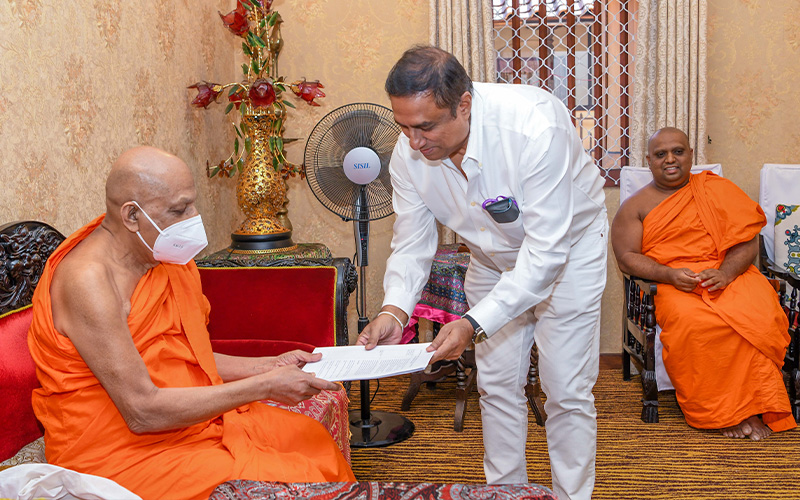
The Interim Secretariat for Truth and Reconciliation Mechanism presented a copy of the draft Reconciliation Bill to the chief monks of the Asgiri and Malwathu chapters, despite widespread criticism that the bill fails to account for the census and sentiments of Tamils.
The draft copy of the bill before being presented to Tamil communities in the homeland or civil society, was presented by Asanga Gunawansa, the Director General of the Interim Secretariat to the head of Sri Lanka’s Buddhist clergy - highlighting an attempt by the government to seek their approval whilst ignoring those of the victimized communities.
Thibbatuwe Sri Sumangala Mahanayaka of the Malwatu chapter and Warakagoda Sri Gnanaratana of the Asgiri Chapter agreed to review the draft bill jointly and provide their comments and observations.
Tamils have repeatedly rejected the bill, the latest attempt at reconciliation by the Ranil Wickremasinghe government, and instead have called for an international accountability mechanism.
International Commission of Jurists (ICJ), in a statement issued last month, said a bill gazetted by Sri Lanka to establish a Commission for Truth, Unity, and Reconciliation, "lacks credibility and is unlikely to bring accountability"
“Considering the repressive political climate in Sri Lanka, and the absence of the conditions that are necessary to ensure the success of the proposed Commission for Truth, Unity, and Reconciliation, the Bill appears to be more of a legislative manoeuvre aimed at deflecting the attention of the Human Rights Council and removing Sri Lanka from further scrutiny rather than a genuine accountability measure,” said Melissa Upreti, ICJ’s Asia Director.
The ICJ finds that the Bill would empower the Attorney General (AG) to prosecute cases where the commission makes a finding of responsibility, however, the ICJ is concerned that the actions of the AG’s department in the past including the mishandling of cases relating to human rights violation and inaction of others have caused a trust deficit which will likely continue.
The Bill provides that appointments to the commission will be made by the President upon recommendation of the Constitutional Council, however in reality the ruling party holds the majority in the Constitutional Council and any recommendations will be subjected to political pressures. In light of these realities, the ICJ questioned if these arrangements are conducive to creating a commission that is independent and equally representative of both gender and ethnicity.
Existing transitional justice institutions such as the Office of Missing Persons (OMP) and the Office for Reparations have been ineffective, it noted. As underscored by the UN Office of the High Commissioner for Human Rights, the OMP has failed to earn the trust of victims and their representatives. As recently observed by the High Commissioner, there has been little to no development regarding cases of past human rights violations and abuses.
We need your support
Sri Lanka is one of the most dangerous places in the world to be a journalist. Tamil journalists are particularly at threat, with at least 41 media workers known to have been killed by the Sri Lankan state or its paramilitaries during and after the armed conflict.
Despite the risks, our team on the ground remain committed to providing detailed and accurate reporting of developments in the Tamil homeland, across the island and around the world, as well as providing expert analysis and insight from the Tamil point of view
We need your support in keeping our journalism going. Support our work today.
For more ways to donate visit https://donate.tamilguardian.com.

